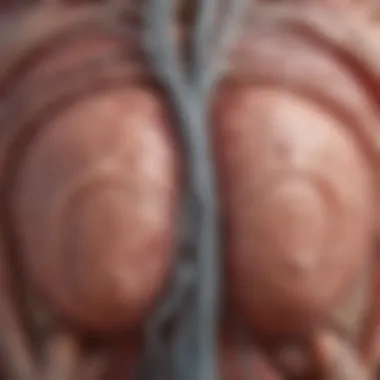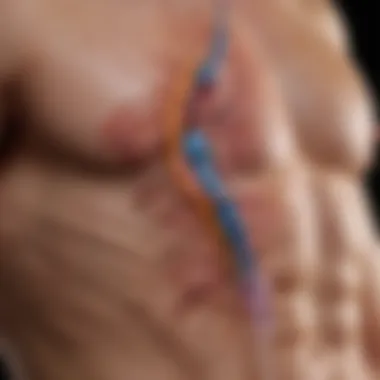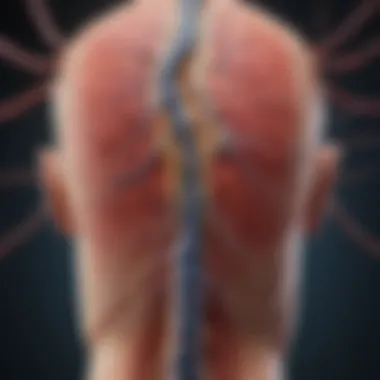Erectile Dysfunction from Nerve Damage: An In-Depth Exploration


Intro
Erectile dysfunction (ED) affects millions of men worldwide. Among the various causes of this condition, nerve damage plays a critical role. Understanding the link between nerve problems and ED is essential for devising effective treatment strategies. Two major aspects to consider are the biological mechanisms behind nerve damage and its overall impact on men's health.
This exploration of erectile dysfunction caused by nerve damage seeks to clarify these connections. It will take a closer look at how specific conditions can damage nerves and how this leads to problems with erectile function. This article also aims to inform practitioners and affected individuals about potential outcomes and available treatments.
Understanding Erectile Dysfunction
Erectile dysfunction (ED) is not merely a matter of personal discomfort or a significant blow to self-esteem; it is a condition that can encompass serious health implications and profoundly affect one’s quality of life. Understanding ED is essential in order to address the multitude of factors contributing to this issue. By diving deep into its definition, symptoms, and epidemiological context, we can better uncover the seriousness of the problem and the urgency for intervention.
By comprehensively examining erectile dysfunction, individuals, healthcare providers, and researchers can reshape perceptions about this condition. It highlights the interconnectedness of physical health, psychological well-being, and social factors. Furthermore, as awareness increases, so does the potential for reduced stigma surrounding discussions about sexual health, enabling more affected individuals to seek help.
Definition and Symptoms
Erectile dysfunction is defined as the inability to achieve or maintain an erection adequate for satisfactory sexual performance. This inability can manifest in various degrees, from occasional difficulties to the complete inability to achieve an erection. Symptoms may include reduced sexual desire, inability to achieve an erection, trouble maintaining an erection, or the presence of premature ejaculation.
These symptoms can arise due to diverse causes, including anxiety and depression, hormone imbalances, or physical factors such as nerve damage. Recognizing these symptoms is critical, as self-awareness often propels affected individuals to seek necessary medical attention.
Some common indicators of ED include:
- Difficulty obtaining an erection
- Difficulty maintaining an erection during sexual activity
- Decreased sexual desire or interest
- Anxiety relating to sexual performance
Epidemiology of Erectile Dysfunction
The prevalence of erectile dysfunction is an important aspect of its understanding. Studies have shown that ED affects a significant portion of the male population. According to various sources, approximately 52% of men over the age of 40 may experience some form of erectile dysfunction. However, the severity and frequency of symptoms can vary widely across different age groups and populations.
Erectile dysfunction is not strictly a condition of aging; younger men can also experience it, often linked to lifestyle factors or underlying health conditions. A brief overview of important statistics includes:
- The likelihood of developing ED increases with age, with rates reported as high as 75% for men over 70.
- Chronic illnesses such as diabetes and hypertension contribute to the prevalence of ED, especially in middle-aged and older men.
- Psychological factors, including stress and depression, can also impact erectile function at any age.
Understanding the epidemiology of erectile dysfunction underscores the importance of acknowledging this condition's widespread nature. Awareness and education regarding ED can lead to early diagnosis and treatment, improving the lives of many.
Nerve Anatomy and Function
Understanding nerve anatomy and function is crucial to comprehending erectile dysfunction resulting from nerve damage. Nerves play a pivotal role in transmitting signals that are necessary for the physiological processes involved in achieving and maintaining an erection. Without a thorough grasp of how nerves operate, it becomes challenging to appreciate the intricate relationship between nerve damage and erectile dysfunction.
Overview of the Nervous System
The nervous system can be divided primarily into two components: the central nervous system (CNS) and the peripheral nervous system (PNS). The CNS consists of the brain and spinal cord, serving as the command center for processing information. In contrast, the PNS extends throughout the body, including all peripheral nerves. This network of nerves connects the central nervous system to limbs and organs.
Nerves can be further categorized into sensory, motor, and autonomic nerves. Sensory nerves relay information from the body to the brain, such as touch or pain, while motor nerves transmit signals from the brain to muscles for movement. Autonomic nerves regulate involuntary bodily functions, such as heart rate and digestion.
The autonomic nervous system, which includes sympathetic and parasympathetic systems, plays an essential role in sexual function. The sympathetic nervous system is associated with the body's 'fight or flight' response, while the parasympathetic system promotes relaxation and is crucial for sexual arousal and erection. Understanding these systems is key to recognizing how disruptions in nerve function can lead to erectile dysfunction.
Role of Nerves in Sexual Function
Nerves directly influence sexual function through the process of erection, which involves both psychological and physiological components. When a man becomes sexually aroused, signals travel from the brain through the spinal cord and peripheral nerves to the penis.
The neurotransmitter nitric oxide is released, which enhances blood flow into the erectile tissue of the penis. This engorgement is what causes the penis to become erect. If nerve damage occurs, whether through injury, surgery, or neuropathy, this signaling pathway can be disrupted.
Important points regarding nerve function in sexual health include:
- Signal Transmission: Successful erection relies on uninterrupted nerve signaling from the brain to the penis.
- Blood Flow Regulation: Nerves control blood vessels' dilation, essential for achieving erections.
- Psychological Factors: Sexual function is not solely physical; mental health and emotional states can significantly impact nerve function.
When evaluating nerve-related erectile dysfunction, it is vital to consider both the structural aspects of nerves and their functional capabilities. This understanding forms the foundation for further exploration into how various conditions may lead to nerve damage.
"Erectile dysfunction often results from a complex interplay between nerve damage and vascular or psychological factors, underscoring the need for a holistic approach to treatment."
"Erectile dysfunction often results from a complex interplay between nerve damage and vascular or psychological factors, underscoring the need for a holistic approach to treatment."


Recognizing the vital contributions of nerve anatomy and function allows for a more nuanced view of the challenges faced by individuals with erectile dysfunction stemming from nerve-related causes.
How Nerve Damage Affects Erectile Function
Nerve damage can have profound consequences on erectile function. It impacts the communication between the brain, nerves, and blood vessels, which are all essential for achieving and maintaining an erection. Understanding this topic is crucial, as nerve damage may often be overlooked or misdiagnosed in individuals experiencing erectile dysfunction. By exploring this area, we can better appreciate the complexities of nerve-related erectile dysfunction and the multiple layers of treatment that may be necessary.
Types of Nerve Damage
Nerve damage can be categorized into several types, each with different implications for erectile function. These include:
- Peripheral Neuropathy: This type of damage often occurs in diabetic patients. High blood sugar levels can cause nerve degradation, affecting sensory and motor functions, along with sexual functions.
- Autonomic Neuropathy: This affects the autonomic nervous system, which controls involuntary bodily functions. Damage here can disrupt the signals needed for erection, making it difficult to achieve sexual arousal.
- Localized Nerve Damage: Typically resulting from surgeries, such as prostatectomy, this damage is confined to specific areas. It can significantly impact erectile function if the pelvic nerves are affected.
- Traumatic Nerve Injury: Nerve damage from physical trauma can vary in severity. Depending on the nature of the injury, it can lead to immediate or delayed erectile dysfunction.
Insufficient healing or regeneration of nerves contributes heavily to the severity of erectile dysfunction.
Mechanisms Leading to Erectile Dysfunction
The mechanisms through which nerve damage leads to erectile dysfunction are intricate. They involve multiple systems within the body. Some key processes include:
- Impaired Nerve Signals: When nerves are damaged, the signals between the brain and genital area can be disrupted. This lack of signaling impairs the natural arousal process, making erections less likely.
- Vascular Dysfunction: Nerves regulate blood flow to the penis. Damage can hinder the ability to dilate blood vessels, limiting blood flow required for achieving an erection.
- Psychological Factors: Chronic pain or discomfort due to nerve issues can lead to anxiety, further exacerbating erectile problems. This psychological component plays a significant role in the overall experience of erectile dysfunction.
- Hormonal Changes: Nerve damage can indirectly affect hormone levels, particularly testosterone, thus negatively influencing sexual function.
In summary, the mechanisms of nerve damage on erectile dysfunction are multi-faceted and understanding this can guide targeted treatments.
Common Causes of Nerve Damage Associated with ED
Understanding the common causes of nerve damage associated with erectile dysfunction (ED) is crucial for a comprehensive grasp of the condition. Identifying these causes can provide significant insight into prevention and treatment options. Recognizing how these elements significantly impact nerve integrity helps better understand the biophysical mechanisms leading to erectile issues.
Diabetes
Diabetes is one of the most prevalent conditions leading to nerve damage. High sugar levels can lead to diabetic neuropathy, affecting nerves throughout the body, including those involved in sexual function. When the blood vessels are damaged, blood flow is reduced, which in turn impacts the ability to achieve and maintain an erection.
- Important considerations for individuals with diabetes include:
- Regular monitoring of blood sugar levels.
- Maintaining a healthy lifestyle, which includes diet and exercise.
- Consulting healthcare professionals regularly.
Prostate Surgery
Prostate surgery, particularly radical prostatectomy, poses a high risk of nerve injury. During the removal of the prostate, surrounding nerves may become compromised. This can lead to erectile dysfunction post-surgery. Understanding these risks before surgery is vital for patients considering such interventions.
Quote: "Preoperative counseling about potential erectile dysfunction is essential for patients undergoing prostate surgery."
Quote: "Preoperative counseling about potential erectile dysfunction is essential for patients undergoing prostate surgery."
Focusing on nerve-sparing techniques can help mitigate the risk, though not all procedures allow for this approach. Patients must have realistic expectations and be informed about potential outcomes.
Neurological Disorders
Neurological disorders such as multiple sclerosis or Parkinson's disease can impair nerve function. These conditions interfere with the signals sent between the brain and the body, affecting sexual arousal and erectile ability. Understanding how these disorders progress can guide management strategies.
- Important aspects to consider include:
- Early diagnosis can lead to better management of symptoms.
- Collaborative approaches that involve physiotherapists, psychologists, and specialists improve quality of life.
Trauma or Injury
Trauma or injury to the pelvic area can also lead to nerve damage. Accidents or surgical complications may disrupt nerves crucial for erectile function. Such injuries may not only affect the physical aspects but can also have psychological ramifications.
Individuals recovering from trauma must engage in rehabilitation focused on nerve recovery. This may include medication, physical therapy, and psychological support.
Diagnosis of Nerve-Related Erectile Dysfunction


Diagnosing nerve-related erectile dysfunction (ED) is crucial for a comprehensive understanding of the condition. Accurate diagnosis can greatly influence the choice of therapy and overall treatment strategy. It also helps to identify the underlying causes of nerve damage, allowing for timely interventions. Proper assessment can lead to more effective management and a potential return to normal function.
Clinical Evaluation
During a clinical evaluation, healthcare practitioners gather a thorough patient history. This includes discussions about sexual history, medical history, and any current medications. It is vital to understand how long the erectile dysfunction has been occurring and if there are associated issues such as pain or other sexual concerns.
Physical examination typically focuses on several areas relevant to ED, such as:
- Genital examination to assess anatomical issues
- Evaluation of secondary sexual characteristics (e.g., body hair, breast tissue)
- Neurological examination to identify nerve damage symptoms
This evaluation is often supplemented by questionnaires and surveys. These tools help quantify the severity of erectile dysfunction and its impact on quality of life. All this information aids health professionals in making an informed diagnosis.
Diagnostic Tests and Procedures
Following the clinical evaluation, specific diagnostic tests can offer deeper insights into nerve-related erectile dysfunction. These may include:
- Blood tests: To check hormone levels, blood sugar, and cholesterol.
- Ultrasound: This can visualize blood flow to the penis and detect any circulatory issues.
- Nocturnal penile tumescence test: This measures erections during sleep, helping differentiate between physical and psychological causes.
- Neurological tests: These assess reflexes and sensation in the genital area.
Together, these assessments provide a comprehensive view of the patient's condition. The combination of clinical evaluation and targeted tests allows healthcare providers to create a tailored treatment plan for individuals affected by nerve-related erectile dysfunction.
Accurate diagnosis is the first step in managing erectile dysfunction effectively. Without understanding the root cause, treatment may not address the real issues.
Accurate diagnosis is the first step in managing erectile dysfunction effectively. Without understanding the root cause, treatment may not address the real issues.
Treatment Options for Nerve-Induced ED
Erectile dysfunction arising from nerve damage is not only a medical issue but also impacts the quality of life significantly for affected individuals. It is vital to understand the various treatment options available, as they can help restore function and improve interpersonal relationships. Treatment approaches range from medications to more invasive surgical interventions. Each option brings its own set of benefits and considerations that patients must evaluate with their healthcare providers.
Medications
Medications are a frontline approach to addressing nerve-induced erectile dysfunction. Several types of drugs are used based on the underlying cause and extent of nerve damage.
Phosphodiesterase type 5 (PDE5) inhibitors are the most common category of drugs prescribed. These include well-known medications like Sildenafil and Tadalafil. They work by increasing blood flow to the penis, which is crucial for achieving and maintaining an erection.
Moreover, it is important to note that medications may not be effective for everyone. Some patients might experience side effects such as headaches, flushing, or gastrointestinal issues. Thus, consulting a healthcare professional is crucial for determining the suitability and correct dosage of these medications.
"Effective management of nerve-related ED often begins with a thorough understanding of the available medication options."
"Effective management of nerve-related ED often begins with a thorough understanding of the available medication options."
Therapeutic Approaches
Beyond medications, various therapeutic approaches can aid in managing nerve-induced erectile dysfunction. These methods often complement pharmacological treatments and can contribute significantly to overall well-being.
Psychosexual therapy is one option that focuses on the psychological aspects of erectile dysfunction. This therapy can help address anxiety, depression, or relationship issues related to ED. Additionally, vacuum erection devices (VEDs) are a non-invasive method to improve erectile function. They work by creating a vacuum around the penis, helping to increase blood flow and create an erection.
Furthermore, penile rehabilitation is becoming more recognized. This technique may involve a combination of medications, injections, and devices to maintain penile health and function during recovery periods, especially after nerve surgery.
Surgical Interventions
In cases where conservative treatments fail to provide relief, surgical interventions may be necessary. These procedures are typically considered after thorough evaluations and discussions with healthcare professionals.
One common surgery is penile prosthesis implantation. This involves inserting devices into the penis that can allow for erections when needed. While this option provides a definitive solution, it requires careful consideration of risks, benefits, and potential complications.
Additionally, vascular surgeries may be applicable for some individuals. These surgeries aim to improve blood flow to the penis by addressing any circulatory issues that may contribute to erectile dysfunction.
In summary, treatment for nerve-induced erectile dysfunction encompasses a variety of options, both non-invasive and surgical. The effectiveness of these options can vary based on individual circumstances, including the cause and extent of nerve damage. Therefore, it is crucial for individuals to engage in open discussions with healthcare providers to choose the most appropriate treatment plan for their needs.
Lifestyle Modifications and Their Impact
Lifestyle modifications play a crucial role in managing erectile dysfunction (ED) caused by nerve damage. While medical treatments are available, changes in daily habits can enhance effectiveness and contribute to overall well-being. Understanding these modifications can empower individuals to take an active role in their health.


Diet and Nutrition
A balanced diet is essential for maintaining vascular health, which directly impacts erectile function. Foods rich in antioxidants, vitamins, and minerals support blood flow and nerve health. Incorporating fruits and vegetables, especially leafy greens, can improve circulation. Additionally, foods high in omega-3 fatty acids, such as salmon and walnuts, are beneficial for nerve repair.
Considerations for Diet:
- Limit saturated fats: High levels can lead to cardiovascular problems, affecting blood flow.
- Stay hydrated: Proper hydration is necessary for overall bodily functions, including sexual health.
- Moderation in alcohol consumption: Excessive drinking can exacerbate nerve damage and impair sexual function.
Exercise and Physical Activity
Regular physical activity is key in improving circulation and reducing symptoms of erectile dysfunction. Exercise can enhance the body’s ability to utilize oxygen and improve blood flow. Activities such as walking, running, or swimming engage large muscle groups, promoting cardiovascular health.
Benefits of Exercise:
- Reduction of stress: Physical activity can alleviate anxiety, which is often linked to ED.
- Weight management: Maintaining a healthy weight can lower the risk of developing diabetes and other conditions associated with nerve damage.
- Improvement in muscle tone: Strength training can contribute to overall physical health, leading to enhanced sexual confidence.
Mental and Emotional Health
Emotional well-being is essential when addressing erectile dysfunction. Anxiety and depression can worsen ED symptoms and significantly impact relationships. Therefore, managing mental health is a vital component of any treatment plan.
Strategies for Mental Wellness:
- Therapy or counseling: Professional support can help address the emotional difficulties linked to erectile dysfunction.
- Meditation and mindfulness: These practices can reduce stress and increase self-awareness, improving overall mental health.
- Social support: Connecting with friends or support groups can provide encouragement and strengthen emotional resilience.
"An integrated approach, focusing on both physical and mental aspects, can significantly enhance the management of erectile dysfunction."
"An integrated approach, focusing on both physical and mental aspects, can significantly enhance the management of erectile dysfunction."
In summary, addressing lifestyle factors can create a supportive environment for managing nerve-related erectile dysfunction. Each element, from diet to physical activity and mental health, contributes to holistic improvement. By making conscious choices, individuals can positively influence their erectile function and overall quality of life.
Future Directions in Research and Treatment
Erectile dysfunction (ED) arising from nerve damage presents unique challenges in both understanding and treatment. The relationship between nerve integrity and erectile function is complex, and exploring future research and treatment avenues is vital. Advancements in these areas offer hope for improved patient outcomes and enhanced quality of life.
Emerging Therapies
Emerging therapies hold significant promise in the management of nerve-related erectile dysfunction. Researchers are exploring various innovative treatment modalities aimed at restoring erectile function by targeting the underlying nerve damage or enhancing nerve regeneration.
Some notable developments include:
- Stem Cell Therapy: This approach uses stem cells to promote nerve regeneration in affected areas. Initial studies indicate that stem cells can enhance healing in wounded tissues, potentially restoring function.
- Gene Therapy: In gene therapy, specific genes related to erectile function are introduced to the patient’s tissues. This method aims to repair or replace damaged nerve signaling pathways.
- Electrical Stimulation Techniques: Neuromodulation methods, such as sacral nerve stimulation, show potential for enhancing erectile function by stimulating the pelvic nerves.
These therapies are at various stages of clinical trials. More research is needed to evaluate their effectiveness, safety, and application in diverse patient populations.
Innovative Research Findings
Recent studies have shed light on the biological mechanisms behind nerve damage and its impact on erectile function. Ongoing research has identified several key findings that may shape future treatment strategies.
- Inflammation and Nerve Damage: Research indicates that inflammation plays a critical role in nerve damage. Strategies targeting inflammatory pathways may help mitigate the effects of nerve injuries on erectile function.
- Neurotrophic Factors: Neurotrophic factors enhance nerve survival and regeneration. Investigating their role in erectile function offers potential for developing treatments that promote nerve health.
- Endothelial Dysfunction Link: New studies suggest that there is a relationship between endothelial dysfunction and nerve-related ED. Treatments involving vasodilators may not only improve blood flow but also address some of the underlying nerve issues.
"Understanding these innovative findings can lead to better-targeted therapies for individuals with ED resulting from nerve damage, providing hope for improved treatment success."
"Understanding these innovative findings can lead to better-targeted therapies for individuals with ED resulting from nerve damage, providing hope for improved treatment success."
The implications of these findings are profound. They underscore the need for interdisciplinary research that bridges neurology, urology, and pharmacology to inform holistic care approaches. As researchers continue to explore these avenues, the potential to significantly alter the landscape of treatment for erectile dysfunction from nerve damage becomes increasingly tangible.
Ending
The final section of this article focuses on the significant themes surrounding nerve damage related to erectile dysfunction (ED). Understanding this complex interrelationship is paramount for both patients and healthcare providers. This article synthesizes critical elements, including the mechanisms behind nerve-induced ED, diagnostic pathways, and multifaceted treatment options. All these components contribute to a broader comprehension of how nerve health affects sexual function.
Key Takeaways
- Nerve damage can arise from various sources, including chronic conditions like diabetes, surgical interventions, and neurological disorders.
- There are multiple diagnostic tests and clinical evaluations available to identify nerve-related causes of ED.
- Treatments may range from medications and therapeutic options to surgical interventions, each tailored to individual patient needs.
- Lifestyle modifications play an essential role in improving overall nerve health, which can help mitigate symptoms of ED.
Encouragement for Affected Individuals
For individuals experiencing erectile dysfunction from nerve damage, it is crucial to understand that there are pathways toward improvement. This condition often feels isolating, but it is manageable. Consulting healthcare professionals can lead to individualized treatment plans that address not only physical symptoms but also emotional well-being. Support from peers and professionals can help as well. Remember, the journey toward recovery involves small steps, and seeking help is an essential first step.







